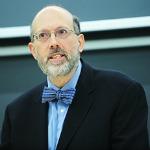Two Professors Elected to American Academy of Arts and Sciences
New York, April 22, 2015—Columbia Law School Professors Jane C. Ginsburg and Philip Hamburger have been elected to the American Academy of Arts and Sciences, a leading center for independent policy research and one of the nation’s most prestigious honorary societies.
Ginsburg is the Morton L. Janklow Professor of Literary and Artistic Property Law and faculty director of the Kernochan Center for Law, Media, and the Arts, which contributes to a broader understanding of the legal aspects of creative works of authorship, including their dissemination and use. Fluent in French and Italian, Ginsburg has been a visiting professor or fellow at a number of distinguished educational institutions, including the University of Paris, the University of Cambridge, the University of Auckland, Hebrew University, and the University of Melbourne. In addition to her role as a professor, Ginsburg has published many works, including three casebooks and numerous articles on domestic and international copyright law. She is also a vice president of the Association Littéraire et Artistique Internationale, a Paris-based international organization created to promote and defend authors’ rights, and president of that organization’s U.S. chapter.
Professors Jane Ginsburg and Philip Hamburger will be inducted into the American Academy of Arts and Sciences at a ceremony in October. |
Hamburger is the Maurice and Hilda Friedman Professor of Law at Columbia Law School and an expert on constitutional law, religious liberty, the history of law, and contracts. He directs the Law School’s Center on Law and Liberty, which studies freedom, threats to its existence, and legal protections designed to ensure its survival. Hamburger has dedicated his career to exploring questions of liberty and law. His interest in the subject began when he was an undergraduate at Princeton University conducting research on England’s Star Chamber, which, during the 16th and 17th centuries mandated that all publications receive governmental approval. Hamburger has continued to explore censorship as a professor, including the limits placed on academic research by universities’ Institutional Review Boards. In his most recent book, Is Administrative Law Unlawful? (University of Chicago Press, 2014), Hamburger argues that U.S. administrative law revives the sort of absolute power the Constitution and courts were designed to prevent.

